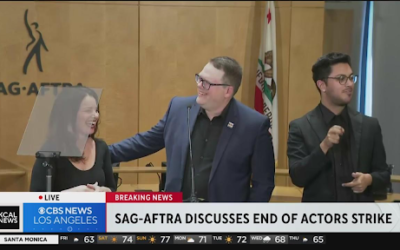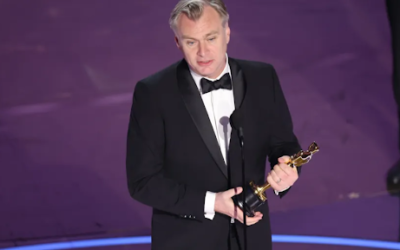Although such ceremonies as the Academy Awards and the Golden Globes tend to receive the most attention during the annual awards season, they are far from the only ceremonies held to honor the many cinematic accomplishments of the previous year. Most of these smaller ceremonies tend to focus primarily on one aspect of filmmaking, whether they hand out awards for a specific medium like the animation-centered Annie Awards or for a particular aspect of the filmmaking process like the Screen Actors Guild Awards, which gives out prizes for acting. Despite these ceremonies being held with less publicity than the larger awards presentations, they are still highly regarded among the filmmaking community, and in some cases, they can even serve as predictors for what will win the industry’s biggest awards.
The Writers Guild of America, for example, is one such organization of which its award ceremony is often used to predict which films will win Oscars in the writing categories. Although the association only hands out three awards for film – Best Original Screenplay, Best Adapted Screenplay, and Best Documentary Screenplay – they do often reflect the films that are nominated for major awards in the exact same category, and those that win the WGA Award in one of these categories are believed to have strong chances (though not necessarily a guarantee) of winning the same award during the larger and more famous ceremony. This is a major reason why the most recent WGA Awards, held on March 21st, 2021, has received a bit more attention than it usually gets, as the films chosen to receive the awards aren’t exactly the most likely of winners.
First, there is the award for Best Original Screenplay, which is given to films of which their narratives were created directly for the screen. Going into the awards ceremony, renowned screenwriter Aaron Sorkin was expected by many to receive the award for his screenplay “The Trial of the Chicago 7”, considering that Sorkin had already won several other awards for this film, including the Golden Globe. Among the other films contending for the award were “Judas and the Black Messiah” (screenplay by Will Berson and Shaka King; story by Berson, King, Kenny Lucas and Keith Lucas), “Palm Springs” (screenplay by Andy Siara; story by Siara and Max Barbakow), and “Sound of Metal” (screenplay by Darius Marder and Abraham Marder; story by Darius Marder and Derek Cianfrance). In the end however, the prize was given to Emerald Fennell for her film “Promising Young Woman”.
Then there’s the award for Best Adapted Screenplay, given to films that have been adapted from pre-existing written material. Considering the strength of the films nominated, any one of them could have taken home the prize, especially given the absence of Chloe Zhao’s “Nomadland”, which is currently seen as the frontrunner for not only the Oscar for Best Adapted Screenplay, but for the grand prize of Best Picture as well. It could have gone to Ruben Santiago-Hudson’s script for “Ma Rainey’s Black Bottom” (based on the play by August Wilson), or maybe Paul Greengrass and Luke Davies’ screenplay for “News of the World” (based on the novel by Paulette Jiles). Kemp Powers could have also taken home the prize for his script for “One Night in Miami…” (based on his stage play), or perhaps Ramin Bahrani could’ve done so for writing “The White Tiger” (based on the book by Aravind Adiga). As it turned out however, the award would given not to any of these films, but to the comedy sequel “Borat Subsequent Moviefilm”, its screenplay written by Sacha Baron Cohen (the creator of the character this film is based on), Anthony Hines, Dan Swimer, Peter Baynham, Erica Rivinoja, Dan Mazer, Jena Friedman, and Lee Kern; its story conceived by Cohen, Hines, Swimer, and Nina Pedrad.
Both these films and their wins of their respective WGA Awards have received their fair share of surprised reactions from analysts and the general public, each for their own different reasons. While there are very few who doubt the quality of “Promising Young Woman” or its writer/director Emerald Fennell, its win has been seen as a major upset due to how many had predicted “The Trial of the Chicago 7” and its scribe to take home the award, especially how many writing prizes the film had received already. “Borat Subsequent Moviefilm”, meanwhile, has a script that is largely derived from improvised material (which may explain why so many people are credited with writing the screenplay), as the film is a mockumentary that involves the characters interacting with real-life people (i.e. non-actors) and recording the reactions that occur. This is far from the conventional process of writing a screenplay, let alone one that is worthy of awards recognition, so to many, the film’s win is a major shock, even by the standards of the typical awards ceremony.
The major question on everyone’s minds is how the results of the WGA Awards will influence the results of the Oscars, at least as far as the writing categories are concerned. “Promising Young Woman” and Emerald Fennell are not yet the frontrunner for the Oscar for Best Original Screenplay, with many industry pundits still anticipating a win for Aaron Sorkin and “The Trial of the Chicago 7”, but given the former’s WGA win, the chances of the latter winning the Oscar have become much less certain, especially given that some of the more recent previous winners of the WGA, including “Get Out” and “Parasite”, would go on to the win the Oscar in the same category. As for “Borat Subsequent Moviefilm” and its multiple writers, even if one chooses to disregard the unusual circumstances surrounding the creation of its screenplay, the competition provided by Chloe Zhao and “Nomadland”, snubbed from the WGA Awards but still a major contender for the Oscars, will likely be too great for the “Borat” sequel to overcome, even if previous WGA/Oscar winners of the category, such as “Call Me By Your Name” and “Jojo Rabbit” suggest otherwise.
At the end of the day though, nothing is certain, so it will be quite interesting to see how the results of the WGA Awards compare to what will eventually win the Oscars.




